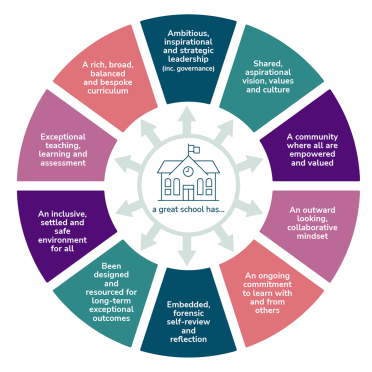By Jeremy Loukes, Director of Education Services (Primary & Early Years)
We all have a sense of how a great school would look and feel:
- A school we would want our children to attend to achieve the best possible start in life
- A school we would want to work in, where we would be supported to become the best possible versions of ourselves as educators
- A school we would want to be enriching the community we live in.
The framework we use to set our aspirations for, and to judge schools by, is typically that of Ofsted. At the time of writing, we’re once again awaiting a new Ofsted framework. We have grown accustomed to frequent changes since the first version was published in 1992. Each iteration brings a slightly different focus on the various aspects of schools’ work. There is a danger that we become overly dependent on Ofsted’s framework, overlooking aspects that are not currently in vogue. We risk swinging from pillar to post and neglecting the fundamental building blocks that comprise a great school.
The Great School Framework (GSF) – the collective work of colleagues from across HFL Education – was born in 2018.

The GSF is undeniably and unapologetically ambitious, aspirational and visionary. It describes the constituent parts of a utopian school – a goal that all schools are likely to strive towards but which is perhaps ultimately unattainable. We suspect that there is no such thing as a universally “great school”, and that if any school thought it was great in every aspect, it would already be on a downward trajectory of self-delusion and complacency. What a wonderfully exciting journey to embark on, though – to aim to get as near to the summit as possible, in the knowledge that every step taken towards greatness in each of the GSF’s 10 features – its lenses – will improve the quality of education and outcomes for pupils.
The language of the GSF has been chosen carefully. It is significant that the adjective “great” is not in the mainstream Ofsted vocabulary. Our vision of a great school goes well beyond the currently applied Ofsted “outstanding” descriptor. The features of the framework cover aspects of provision that Ofsted does not currently evaluate. We have striven to create a framework that would have been as relevant to schools and settings 20 years ago as it is today, and which will still be relevant in 20 years’ time. The aim is that the framework is classic and timeless. The ten lenses are non-sequential and non-hierarchical, but there are links between them. The ten lenses are:
- Ambitious, inspirational and strategic leadership (including governance)
- Shared, aspirational vision, values and culture
- A community where all are empowered and valued
- An outward-looking, collaborative mindset
- An ongoing commitment to learn with and from others
- Embedded, forensic self-review and reflection
- Designed and resourced for long-term exceptional outcomes
- An inclusive, settled and safe environment for all
- Exceptional teaching, learning and assessment
- A rich, broad, balanced and bespoke curriculum
This article doesn’t allow an exploration of each of the ten lenses but does let us delve into a couple. First let’s think about the lens titled “Ambitious inspirational and strategic leadership”. The GSF articulates leadership in great schools as visionary, inspiring, and values-based. It states that leaders in great schools:
- Communicate a compelling vision for the future and set high expectations
- Are strong planners and organisers
- Are committed to high-quality, sustainable education
- Pay attention to details and to achieving results
- Nurture, motivate, and build relationships
- Practise distributed leadership to foster growth and development
- Recruit and retain great staff, invest in workforce development, and create an optimistic environment
- Collaborate with other schools and external agencies to build networks and relationships
Let’s also consider the “An inclusive, settled safe environment for all” lens.
At a great school, every staff member is dedicated to:
- Upholding positive behaviour for learning policy, ensuring consistency across the board
- Ensuring pupils are trusted to and do act responsibly, managing their own behaviour, and that they feel a sense of belonging
- Celebrating effort and success and fostering a positive growth mindset
- Ensuring high expectations are maintained with fair consequences, and any bullying or prejudice is swiftly addressed
- Supporting pupils to lead healthy lifestyles and to manage their mental health, while they learn to handle risks and build relationships
- Ensuring classrooms promote independent learning and safe risk-taking
- Giving high priority to the needs of learners who are currently disadvantaged or who have SEND
- Making sure every pupil’s voice is heard and valued
It’s all very well setting out our ambition and knowing where we’re heading. This is a crucial first step. Travelling towards the destination can be challenging, and the GSF is intended to make the journey easier – it’s a tool that can be applied in many situations. It might:
- Provide the basis for debate and discussion
- Facilitate in-school, school-to-school, peer and external school improvement activity
- Support self-evaluation
- Promote school improvement planning
The Great School Framework
Explore and think about how the GSF might help with your own school improvement journey. Contact us if you’d like any support.

